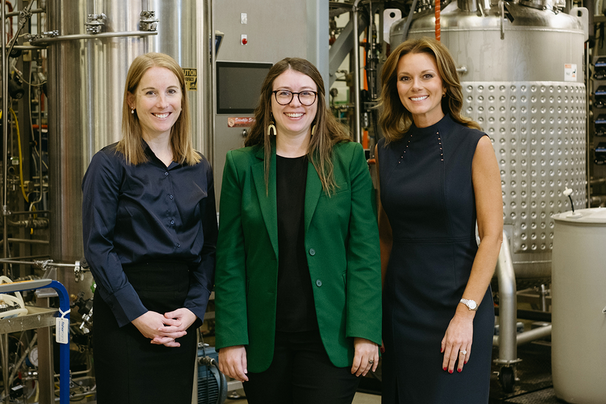A year-long campaign to boost biomanufacturing in central Illinois has paid off for the University of Illinois and its partners.
The U.S. Department of Commerce's Economic Development Administration will award approximately $51 million to a University of Illinois-led consortium to establish the Illinois Fermentation and Agricultural Biomanufacturing (iFAB) Technology Hub in Champaign, Piatt and Macon counties.
iFAB's goal is to foster the development in Central Illinois of biomanufacturing, including precision fermentation. These new technologies are being used to produce medicines, foods, beverages and industrial materials from agricultural feedstocks such as corn and soybeans. Proponents of biomanufacturing believe it could be a viable alternative to products currently made with fossil fuels.
Beth Connerty of the university's Integrated Bioprocess Research Laboratory (IBRL) is the regional innovation lead for the new iFAB technology hub. Once fully established, Connerty said, iFAB will help small and medium-sized companies that currently have to go to Europe or China find facilities to scale their biomanufacturing projects from pilot to demonstration stages.
“The main reason for that is that the resources needed to make that happen don't currently exist in the U.S.,” Connerty said, “and we think this iFAB grant, and many of the projects that are being funded, will really help change that.”
The five-year grant from the Economic Development Administration will help build a new precision fermentation facility at IBRL on the University of Illinois Urbana campus, upgrade fermentation facilities at Archer Daniels Midland Co.'s plant in Decatur, and increase fermentation capacity at Primiento's Decatur facility (a joint project with New York-based Synonym Inc.). The grant will also support management of the iFAB tech hub.
Nicole Bateman is president of the Decatur and Macon County Economic Development Corporation, one of the partners in the iFAB consortium. She and the other iFAB partners envision the Decatur-Champaign region as a catalyst for economic growth, where companies that come to central Illinois to take advantage of biomanufacturing facilities will stay in the region as they grow.
“That means they're moving here,” Bateman said, “they bring their families, they enroll in our schools, they build homes, and then eventually, after they go through that whole growth process, they set up businesses in the area, which means more jobs, more retail, more shopping.”
Bateman said central Illinois was an ideal location for a technology hub because of the biomanufacturing and research already taking place there and its proximity to the corn and soybeans that are used as feedstocks.
Other members of the iFAB Consortium include the Champaign County Economic Development Corporation, Parkland and Richland Community Colleges, industry companies and associations, labor unions and workforce training organizations, and state and local governments.
iFAB is one of 12 tech hub projects to receive funding totaling $504 million announced by the federal Economic Development Administration on July 2. The grants were authorized by the CHIPS and Science Act, a federal law passed in 2022 to promote science and technology research.
The EDA is also funding another biomanufacturing project in the Indianapolis metropolitan area: Heartland Bioworks will focus on “increasing the region's capacity to manufacture and deploy life-saving medicines,” according to the EDA's website.

